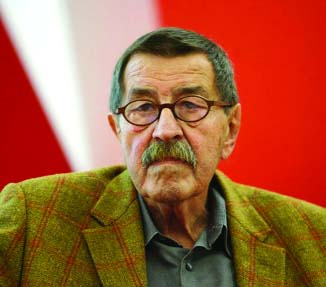
BBC Online :Guenter Grass, German Nobel literature prize winner and author of The Tin Drum, has died aged 87.His publisher said he passed away at a clinic in Luebeck on Monday morning.Born in what was then Danzig, Grass served in the German military in World War Two and published his breakthrough anti-Nazi novel, The Tin Drum, in 1959.Later in life he became a vocal opponent of German reunification in 1990, and argued afterwards that it had been carried out too hastily.Grass’s work was “a formidable reflection of our country and a permanent part of its literary and cultural heritage,” German President Joachim Gauck said in a statement (in German).Foreign Minister Frank-Walter Steinmeier was “deeply dismayed” to hear of the author’s death, the German foreign ministry tweeted.Writer Salman Rushdie described Grass as “a true giant, inspiration, and friend”.Grass’s home town became the Polish city of Gdansk after the war; he spent much of his later life living near Luebeck.Many of his writings focused on the Nazi era, the horrors of the war, and the destruction and guilt that remained after Germany’s defeat.Germans were shocked when he revealed in his 2006 memoir, Skinning the Onion, that as a teenager he had volunteered to join the army and had served in the Waffen-SS – the combat arm of Hitler’s dreaded SS paramilitary force, which was responsible for atrocities throughout Nazi-occupied Europe.Previous accounts of his life had suggested he had been an anti-aircraft gunner and had been conscripted into the military.After the war he spent months in an American prisoner of war camp.He was very committed politically, impulsive, emotional – he stirred things up.He was a narrator of history, telling Germans about their origins.His character was that of a patriarch with followers – he didn’t like being contradicted. He could be quite aggressive.For the first generation of post-war intellectuals the priority was to build a new justice system, democracy. Grass then came in the second wave, and said we must also tackle the issue of guilt and what had happened in the war.Some older Germans didn’t want discussion of the wartime crimes, but it was very important to have it put on the agenda.The Tin Drum had a biblical energy – it was part fairy tale, part survival story in a brutal world.His Danzig homeland often played a role in his work – he wanted to show Danzig’s roots, how it was before the war.When he admitted to joining the Waffen-SS in his youth the criticism was a big blow to him, as he had attacked so many people before for not being open.But he had documents showing he had spoken about it earlier, and I don’t think the attack on him was justified.He liked the grotesque, though his humour was sometimes a bit overdone. He was very close to his grandchildren and loved to dance – that showed a different side of him.He radiated energy and had other artistic talents, as a sculptor and painter.Grass revealed in his 2006 memoir that he had served in the Waffen-SS during the warGrass went on to train as a stonemason and then studied sculpture, and he remained active in the visual arts. His first book of poetry was published in 1956.The author was awarded the Nobel Prize for Literature in 1999, for portraying “the forgotten face of history”.Praising The Tin Drum, the Nobel committee said that it was “as if German literature had been granted a new beginning after decades of linguistic and moral destruction”.The magical realist novel’s narrator decides to stop growing at the age of three, and watches the adult world around him as events overtake his family and Danzig. He communicates through his tin drum and is able to “drum up the past”, reporting on events he has not witnessed.Grass was politically engaged – campaigning for the Social Democratic Party – and was a major figure in German public life and discourse.A poem published in 2012, What Must Be Said, sparked controversy for its strong criticism of Israel, which barred the writer from the country.

